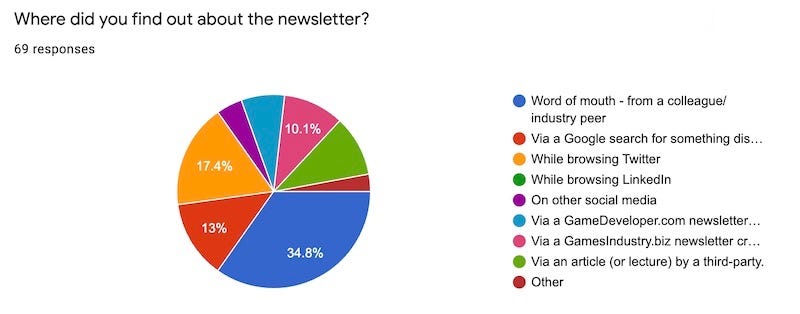Steam's U.S. antitrust lawsuits fail to get dismissed - now what?
Also: what do you all think of this newsletter, anyhow?
[The GameDiscoverCo game discovery newsletter is written by ‘how people find your game’ expert & company founder Simon Carless, and is a regular look at how people discover and buy video games in the 2020s.]
Welcome to the week as we see it, folks. And it’s another busy one, headed by some interesting new filings in a couple of U.S. lawsuits targeting Steam creator Valve. Where could those be going? We don’t know, but we’ll speculate..
Elsewhere in this edition, there’s a data-based look at whether y’all actually dig this darned newsletter - plus a LOT of links and info to round everything out. So let’s get to it…
[Help us flourish, and get analysis, data, and peer feedback all at the same time? Our GameDiscoverCo Plus paid sub has a data-rich weekly game trends analysis, interactive Steam ‘Hype’ charts, two eBooks, a member-only Discord & more. Sign up today!]
Valve vs. Wolfire & Dark Catt - what happens now?

So, the path to ‘justice’ is slow and tortuous. And as of late last week, the ‘motion to dismiss’ in two U.S. antitrust cases involving Valve and Steam have been denied. This mean that the suits may continue to the next stage, discovery.
Specifically, if you look at the latest filings in Wolfire Games vs. Valve Corporation, you’ll discover the May 6th filing [.PDF], with 81-year old (!) Washington State District Judge Coughenour ruling that Valve’s attempt to get the case thrown out is only partially successful.
This may be confusing to some of you, because there were headlines back in November 2021 that Wolfire’s case had failed. But as Ars Technica noted, Wolfire “had 30 days to amend its complaint to address the criticisms and absences of facts brought up in this dismissal.” Which they did, and managed to get some of its claims to the next stage.
The original lawsuit brought by Overgrowth dev Wolfire was explained by David Rosen as follows: “Once a company reaches a certain level of power over an entire market, the antitrust laws forbid those companies from distorting competition. I believe that Valve is taking away gamers' freedom to choose how much extra they are willing to pay to use their platform. I believe they are taking away competing stores' freedom to compete by taking advantage of their lower commission rates. I believe they are taking away developers' freedom to use different pricing models.”
In their arguments, Wolfire’s lawyers threw the kitchen sink at Valve - as is common. However, the legal argument and results mainly split into three parts:
Wolfire claimed that “the Steam Platform and Steam Store operate in separate markets”, and therefore it should be possible/permitted to use the platform without using the actual store purchasing mechanisms. The court again rejected this and all related claims, noting that the store part is how you pay for the underlying platform. It doesn’t make practical sense for them to be split.
Additionally, it was claimed that Valve is enforcing pricing parity. The claim? “[Valve] imposes a [platform most-favored nation] regime to non-Steam-enabled games to ‘prevent price competition from rival storefronts’”. Now, the court acknowledges the more detailed claim that “a Steam account manager informed Plaintiff Wolfire that ‘it would delist any games available for sale at a lower price elsewhere, whether or not using Steam keys.’” And it wants to see if there’s more alleged evidence like that. So that claim can go to the next phase.
Finally, here’s a weird one - did Valve have ‘market power’ at the time it started up Steam and set its 30% platform cut? The extra info is as follows: “Defendant acquired the World Opponent Network gaming platform in 2001 and shut it down a few years later, forcing gamers onto the Steam Platform, making Steam ‘instantly… a must-have platform’.” Debatable, but it was a clever enough legal argument that the judge wants to see more.
Additionally, the lawsuit from Dark Catt Studios - the company who got a game banned from Steam before filing it - also got an update waving it through, since it alleges that: “Defendant threatens to, and in some instances does, remove games from Steam if a publisher sells a non-Steam enabled version for a lower price or on more favorable terms elsewhere.” (Really? That happens a lot, does it?)
Next steps - and what happens if Wolfire/Dark Catt ‘wins’?
Just to be crystal clear - both Wolfire and Dark Catt have reached the “fine, now prove it” stage of the legal process. This means that an immensely complex ‘discovery process’ may now start, including depositions, requests for productions of documents (including internal emails from Valve and the other companies), and more.
Does either Wolfire or Dark Catt have a strong enough case to win many of these points, if it got all the way to trial? I personally don’t think that Steam was extensively blocking competitive pricing on other PC platforms that sell games. (Steam key distribution is a more complex point, and arguably Valve’s prerogative. But that’s debatable and complex.) And I certainly don’t believe that the World Opponent Network gave Valve significant market power back in 2004 (!)
Which is where I start to get a bit confused. Neither of these suits seem like very practical ones to me. They are passionate points of view expressed in lawsuit form. You’re only going to be losing money by filing them - and I think both parties will have trouble wholesale winning the case, based on current or future evidence.
But I guess you might unearth something interesting in discovery that could influence public opinion, or force the judge to render a minor judgment against a platform? (But real talk: the Epic vs. Apple judge already said that U.S. courts can’t ‘tell’ a platform to decrease its cut from 30% to 20%. It’s too subjective & interfering. And the Steam ‘platform’ and ‘store’ aren’t ruled as separate. So you can’t take payment yourself, and then use Steam infrastructure.)
Plus: given how expensive the discovery process is, Wolfire or Dark Catt would surely need some kind of financial backer to afford discovery? A little like Peter Thiel vs. Gawker - or the ultimate example of this recently, Tim Sweeney vs. Tim Apple.
I don’t really understand what the upside would be for that person - if they exist. Though of course, IANAL. (Qualified ones, send us your opinions on the case!) And thus - despite making it through adversity, the future of these lawsuits seem cloaked in uncertainty.
What y’all thought of the GameDiscoverCo newsletter..
A few weeks ago, we asked you nicely to give us feedback on this GameDiscoverCo newsletter. And nearly 70 of you did. So, while understanding that only the most engaged folks respond to surveys, here are some of our takeaways to pass along:
You like specifics: the most-voted newsletter sections to continue doing are: “Real-life case studios of Steam/console game sales, wishlists, etc” (90%), and “Developer surveys (e.g. wishlist to sales ratio on Steam, etc.)” (75%) Although you’re interested in thinkpieces, too (73%). (Podcasts less specifically so - 17% in favor.)
The newsletter is long, but you can deal: only 12% of respondents said the GameDiscoverCo newsletter is too long and should be trimmed (phew!) 31% said it was the right size, and 53% said it was long, but had relevant content. And shout-outs to the 3 people who said it should be longer!
You gave us a bunch of great suggestions for new topics: from covering “small studios in the mobile space”, to covering the physical console game distro space, to more info on console game sales/owners in general (we’re working on this, btw!) Lots of awesome ideas.
You really, really like us: the graph at the top of this section makes up the Net promoter score metric after interpretation - one that it’s good to ask people who use any product or service. Different industries get different results, but we’re very happy with our +60 score, which is definitely above average.
Finally, pardon the Google Forms formatting, but it’s intriguing to see the sheer diversity of how people got to find out about the newsletter. Word of mouth, Twitter, and Google searching for ‘game discovery stuff’ were the top 3 overall, though. Hurray:
The game discovery news round-up..
Let’s finish this all up in style, then. Here’s all the news that’s fit to print on game platforms and discovery - at least after lunch on a Monday, at the start of a busy week in video games:
Some big infrastructure issues at Xbox, whose “online DRM policy has been criticised after server outages left some console owners unable to launch their purchased games for a fourth day.” A Tweet from Xbox today says it’s partly resolved, and “we expect full mitigation in the coming days”. But not a great look for a company that’s been super buttoned-up on the tech side, otherwise.
More confirmation for ‘not-E3’ this year: the Summer Game Fest kickoff is “streaming live on Thursday, June 9 at 11a PT / 2p ET / 6p GMT”, and Gruff Keefley (sp?) has also done a deal to livestream Summer Game Fest kickoff, the subsequent Day Of The Devs showcase and December’s The Game Awards to IMAX theaters in the U.S., Canada and the UK.
Creating winning posts on TikTok? Tendy dev Michael Schmitt has a good Twitter thread on just that subject, noting: “My most viewed Tik Tok videos were timelapses of 3D modeling in Clayxels. These had the added benefit of being low-effort to produce.” And intriguingly: “my top three videos did NOT show my face, and did NOT feature my voice.”
In case you missed it: “In partnership with Epic, Fortnite is available via Xbox Cloud Gaming so fans can play on an iOS device, Android phone or tablet, or Windows PC through web browser” - and yes, Tim Sweeney is trolling Apple about it. And you just need a Microsoft account, btw - no memberships. What a smart broadening of the church from Xbox. So wait, can you really play Fortnite on a 3DS now (above)? (Internet says: no, it’s a hoax. Aw.)
This deserves a bulletpoint: ‘open-ended country life RPG’ Stardew Valley has recently announced that “As of March 2022, Stardew Valley has sold over 20 million copies across all platforms, with 13 million copies sold on PC alone.” Staggering numbers, and apparently up from 15 million in September 2021. Again: as a new game, you’re often fighting for attention with great old games… like this one.
The creeping fog of Chinese government video game oversight continues: “Apple… recently began removing from its China App Store mobile games that monetize only through in-game advertisements (“Ad-Only Games”) if the game does not have the required game approval number issued by the National Administration of Press and Publication.” (They were previously spared in a 2020 cull.)
So, a streaming ‘puck/stick’ device to play your Xbox games on a TV without a console? VentureBeat’s Jeff Grubb resurrected the rumor, alongside plans for a Samsung smart TV app, saying both are due in the next 12 months. (The Verge pointed out that even Phil Spencer had teased the former at one point. So seems likely to us.)
Perma-surly UK indie Cliffski has a blog on ‘the erosion of the middle man’ which starts discussing solar farms, then gets into some relevant territory: “Many of the ‘value-add’ features that game-store-middlemen provide have ben eroded over time. They provide the bandwidth to re-download the game! This costs virtually nothing these days, especially for smaller indie games. They provide an online message board for the games players! but so does Reddit, Facebook, and a billion other places.”
Microlinks: Meta is planning to slow hiring due to slowing revenue growth, though presumably AR/VR is still a priority; you can now “share your favorite gaming moments including game clips, screenshots, and achievements” in the Xbox iOS/Android apps; there’s something weird going on with Sony’s Spanish-only PlayStation Talents Games Camp.
Finally, just wanted to end things by paying tribute to Nick Alfieri, the founder of indie publishers Digerati (Severed Steel) and Big Sugar (Sam & Max: This Time It’s Virtual, Unexplored 2), who passed away very unexpectedly late last week.
Nick was a reader of this newsletter, and we’d been consulting with him on discovery matters, even meeting up with him at GDC 2022. His passion for the space was very evident - and he will be sorely missed by colleagues and friends alike.
[We’re GameDiscoverCo, an agency based around one simple issue: how do players find, buy and enjoy your premium PC or console game? We run the newsletter you’re reading, and provide consulting services for publishers, funds, and other smart game industry folks.]





